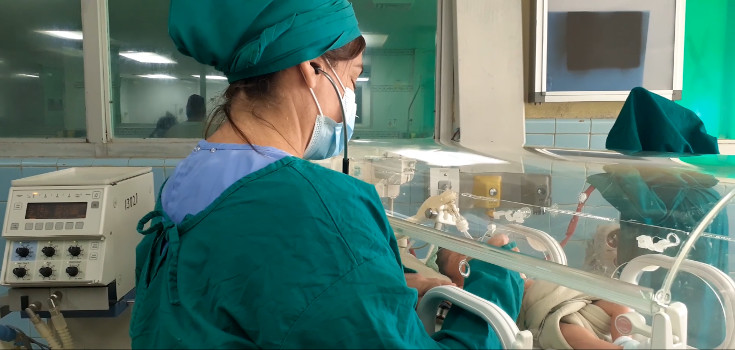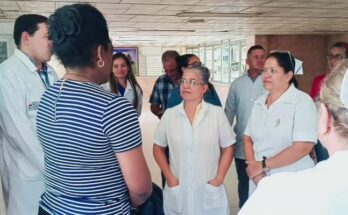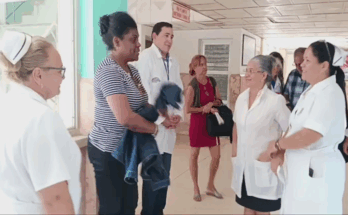Dr. Pedro Pablo Pacheco Aleaga, the acting deputy director of the Olo Pantoja Hospital, guides us to the neonatology ward. There, we meet part of the guard team, including the head of services, Iliana Cabrales Rey.
“Working with newborns presents a remarkable opportunity to assess our cognitive abilities and human sensitivity. At times, people inquire how we can determine what is wrong with a child when they are crying and unable to articulate their discomfort. I would assert that certain pathologies, particularly in newborns, can be inferred from the clinical presentation of the child. Our goal is always to anticipate the needs of the newborn.”
My responsibility is to oversee the nursing front, ensuring that there are no breaches of protocol and that all principles of asepsis and antisepsis are adhered to, facilitating the patient’s positive evolution. Subsequently, we gain access to the area where daily miracles occur, where specialized staff work around the clock.
“This is exemplified by a nurse with 27 years of experience in this intensive care unit. The role of the nurse is indispensable. Primarily, one must seek out their work. Thus, each patient should be approached in an individualized and personalized manner, irrespective of their pathology, as the nature of the condition dictates the care provided to the infant. A common characteristic among this Chief Medical Officer’s staff is that they all pursued this career out of vocation. They are here driven by their passion and love for children.”
“I remained here out of vocation, that is, for my love of the profession, as this field is sometimes somewhat obscure. Students often have limited opportunities to enter this very conservative and closed service, where rotations for medical students can be quite brief, and the subject is not well understood. However, once you become acquainted with it and experience the wonders of this field, you inevitably fall in love. Throughout my student life, I have always had a fondness for pediatrics.
“Even after my graduation, the guards, including the guard corps and pediatrics, were involved. I have always been captivated by the idea of working with children. Upon completing my pre-university studies, I took my examination and subsequently began my nursing degree. Is it challenging to work here? How does it function? Well, when you have a passion for it, it does not feel burdensome. It does not seem difficult. Everything is gradual and requires preparation, and over the years, everything falls into place.”
Graduate Yadira shows her expertise while caring for a newborn baby permanently. Beyond, on the other side of the glass, Nurse Yanet with 22 years of service also does so. Here they work shifts of 12 consecutive hours.
“In those 12 hours we entered at 7 o’clock in the morning, we left at 7 o’clock in the afternoon. At night we do not always have time to leave, because when the service is complicated, many times we leave at 8 o’clock in the evening, because we can’t let a job continue, but just makes me that we can’t let go, because patients are critical, unstable, and then we stay until needed. But the fundamental thing we have is that we work as a team, where we are all for one and one for all.”
“Patients are born at any time, they get complicated at any time, we are few professionals here in this specialty, and so this requires a lot of time, a lot of teamwork, a lot of work even from home, phone calls, case discussions. It also works very well, is a very nice binomial, doctor-nurse, we have very, very, very good relationship. We relate, discuss the case, us with those we care about, and they with their suggestions, as specialists we are.”
Dedication to work is permanent in this collective of the Neonatology Ward of the Olo Pantoja de Contramaestre Hospital. This, together with the high qualification, allows it to preserve a brilliant heritage of the founders. We have teachers whom we remember with much affection, and to whom we owe a great deal, teachers from Santiago, but also those who we have here, like our dear Orlando Barzaga, our dear Pache, who we remember them and have them there every day, because even telephone calls, when we have any doubt or something, we rely on him, Doctor Tania, who was many years and does services also in the department and today is not, but always phone calls, consulting with them some doubt, some that can help us.
In this room, in these hearts, a special energy beats, because those who work here are special human beings. Regardless of all the things, and as you just said, how it is when the room is very full, when we have a lot of work, but when one loves what he does, he puts love to it, he puts dedication, and in the end the work knows the result.
“You’re never prepared for that. You want to deliver the child alive and deliver it well. Telling the family you have a deceased child is painful. They never get over it. To see the baby go home, back with quality of life. We work from the heart.”




